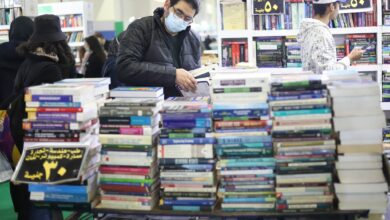The General Egyptian Book Organization last month appointed a committee of reputable writers and literati, headed by author Ibrahim al-Aslan, to reform a cultural project to promote reading, “Maktabet al-Osra” (Family Library).
Since its establishment in 1994, the Family Library has been under continuous scrutiny in the cultural field. A Culture Ministry project created under the leadership of former First Lady Suzanne Mubarak, it was meant to encourage reading among the public by re-printing a selection of classics and newer books at affordable prices.
"Despite its great potential, the project was meant to beautify the face of the Mubarak regime,” says Ahmed Zakaria al-Shalaq, a professor of modern history at Ain Shams University, who is a member of the new committee. “Our main aim now is to make ‘Maktabet al-Osra’ beneficial to all Egyptians."
One main criticism waged against the project was the ambiguous criteria upon which books were selected for republishing, with some making accusations of nepotism and favoritism of writers affiliated with the Mubarak regime. Printing an image of the former first lady on the back of every published book was also a cause for dissatisfaction with the project.
Aslan, who is heading the reform committee, emphasized that the committee's role would be "totally independent of the state and would only focus on developing technical standards of quality like putting together solid selection criteria and developing an overall vision for the project so that readers can draw relations between the books in the yearly selection.”
But to be able to move forward, some committee members believe that library's past role needs to be examined.
“I believe there have been significant improvements in the workings of the project over the past five years,” says Wahid Abdel-Meguid, director of Al-Ahram Center for Translation and Publishing. “The significant decline in the number of books by newspaper editors-in-chief is evidence,” he adds, saying the library used to publish essays by national newspaper editors to flatter them.
"These books kind of died out, yet there’s still no clear selection criteria," says Abdel-Meguid.
Whereas, selection criteria might have been purposefully vague, the taboos were always clear.
“Like most state-sponsored cultural activities, the library suffered from censorship and never printed texts that criticized the political system or call for social justice,” says Shalaq. “But now we have to get rid of all constraints."
Abdel-Meguid says the committee is working on developing and communicating a clear publishing plan to minimize corruption through transparency.
Announcing the plan could keep readers excited and hooked awaiting the library’s new releases, says Shalaq.
Although the project underwent serious financial problems earlier this year as several state and private sponsors pulled out, the 2012 edition is in the works and the government allocated LE 8 million to the project in June at the behest of cultural activists.
A challenge that remains, however, is how the library will coordinate its work with other governmental bodies of a similar function inside the General Egyptian Book Organization, as well as with agencies such as the General Organization Of Cultural Palaces and the Supreme Council of Culture.
"Part of the committee’s job is to make the library’s publications compatible with other bodies in the ministry so that there’s no duplication of efforts,” says renowned translator Talaat al-Shayeb, who is also a committee member.




